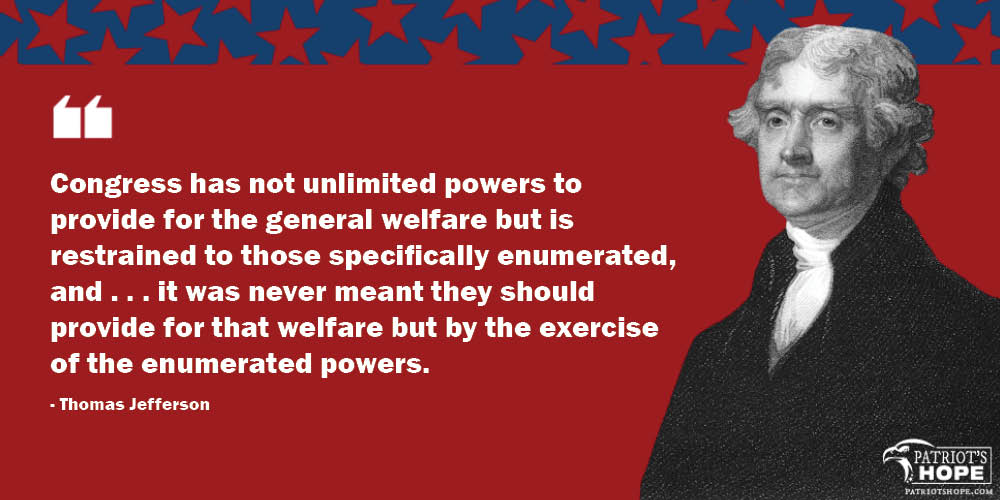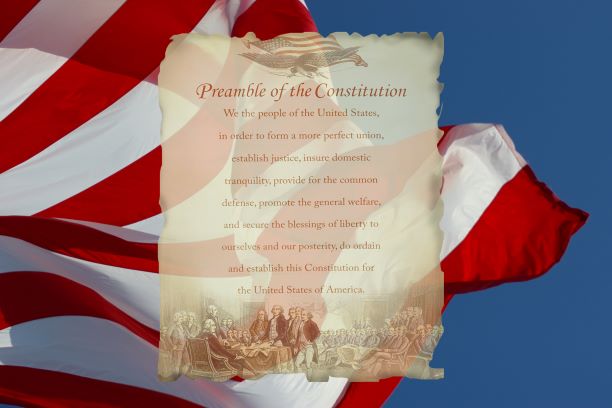Are there exceptions to enumerated powers?
In several of our articles including, “What are Enumerated Powers”, and others, we talk much about enumerated powers. We show how the original intent of our founders was that if the federal government is to have a given power, it must be specifically listed in the Constitution. In “Enumerated Powers Defined in the Constitution”, we show how this idea was clearly codified in the Tenth Amendment to the Constitution. However, there are a few clauses in the Constitution that some claim make exceptions to this idea. They cite clauses in the Constitution like “General Welfare”, or “Necessary and Proper” which they claim leave the door open to government powers not specifically listed in the Constitution. Do these clauses provide a Constitutional exception to the idea of enumerated powers?
The Bottom Line
Clauses like “General Welfare”, or “Necessary and Proper”, are often abused, taken out of context, or misunderstood, but they do not provide a Constitutional exception to the requirement for enumerated powers. We will consider each in their Constitutional context and show these are not, and were never intended by our founders to be, exceptions to the limitation on government of enumerated powers.
What did the founding fathers say about this?
We will take a closer look at each of these terms in their proper Constitutional context and find out what the founders meant when they used them. As we so often find when considering our Constitution, the founders themselves even gave us some great quotations on this subject, so we don’t have to wonder what they would say!
Look at General Welfare
First, let’s consider the “General Welfare” clause. This one frequently comes to mind. Those looking for expansion to federal power usually say Congress can do most anything using this clause as justification. They tend to think this means Congress and the Federal Government may do anything as long as they are generally trying to make things better for Americans… Is that what our founders intended? Let’s look at the two places in the Constitution where we find the phrase, “General Welfare”.
The Preamble
The first place we see the term, “General Welfare”, is in the preamble of the Constitution… It reads, “We the People of the United States, in Order to form a more perfect Union, establish Justice, insure domestic Tranquility, provide for the common defence, promote the general Welfare, and secure the Blessings of Liberty to ourselves and our Posterity, do ordain and establish this Constitution for the United States of America.”
The Preamble does not hold the force of law, and confers no power on any branch of government, but the purpose of the Preamble is to set the stage for why we are writing the Constitution in the first place. It is a helpful reminder to consider what was going on at this time in our history.
Historical Background
If you will remember, our nation declared our independence from Great Britain in 1776. At this point in time, in 1776, all 13 of the original colonies were completely independent of Great Britain, and independent of each other and really were more like what we would consider to be separate countries – not like states of the same country as we consider them now. For the next several years, during the War for Independence, they operated under the Articles of Confederation, which only loosely tied them together. Anything they tried to do together as a group (like fight Great Britain for independence) was weak and ineffective. When the Constitutional Convention convened, they were still fiercely independent, but also understood there were certain functions that should be done together, on behalf of the group of states, which would make all of them stronger and more effective together. These specific areas, or functions where the federal government would act on behalf of all the states together became the “enumerated powers” listed in the Constitution. In doing these limited functions, the federal government would promote the “general” welfare, or the welfare of all the parties (the free and independent states) together. The last thing any of them wanted was to give broad authority to a central government! They were completely capable of governing themselves. They only wanted to designate a limited list of functions they thought could be done better by a federal government on behalf of all of them together.
General Welfare again
The second place we see the term “General Welfare” is in the first paragraph of Article 1, Section 8. It reads, “The Congress shall have Power To lay and collect Taxes, Duties, Imposts and Excises, to pay the Debts and provide for the common Defence and general Welfare of the United States; but all Duties, Imposts and Excises shall be uniform throughout the United States;” Article 1 then proceeds to list the enumerated powers of Congress. This passage is explaining that Congress can collect money through taxes for the purpose of providing for the “Common” defense, and the “General” welfare. The idea is clear, “General Welfare” refers to that which is common to all the parties of the Constitution, which were the 13 original states. They were to accomplish the list of tasks that were about to be specifically listed, in a way that benefitted all the states together. After all, that was the reason we were writing a constitution in the first place was to accomplish a specific list of things that would be better done by a central government on behalf of all the states together. Their experience had shown them they were less effective to attempt these specific functions separately, so they were deciding together that this specific list of powers would be carried out by a central, federal government and would better serve them all – their “General Welfare” – more effectively than it would be to try to do these functions separately. Thomas Jefferson put it this way:
“Congress has not unlimited powers to provide for the general welfare but is restrained to those specifically enumerated, and . . . it was never meant they should provide for that welfare but by the exercise of the enumerated powers.”
– Thomas Jefferson

Federal Government to work for the General Welfare?
This idea that the federal government was to work for the “General Welfare”, or on behalf of all the states together in no way negates the fact that the powers of government are limited by the Constitution. James Madison described what would happen if “General Welfare” was interpreted broadly and allowed Congress to go beyond their enumerated powers. In fact, his description sounds eerily familiar to what we see today! He said:
“…In short, every thing, from the highest object of state legislation down to the most minute object of police, would be thrown under the power of Congress. … Were the power of Congress to be established in the latitude contended for, it would subvert the very foundations, and transmute the very nature of the limited Government established by the people of America.”
– James Madison
Necessary and Proper
There is another clause that is often misunderstood or abused. It is referred to as the “Necessary and Proper” Clause. Often, people in Congress that want to expand power of Congress and the federal government beyond the enumerated powers will cite the “Necessary and Proper” Clause. They will contend that if something is “Necessary and Proper”, then they have the Constitutional authority to pass it. We will find that this argument will also fall short when considered in its proper context as found in a plain reading of the Constitution.
a more Detailed Answer
Article 1, Section 8 of the Constitution begins, “The Congress shall have Power…”, and then goes straight into the list of the enumerated powers of Congress. “To lay and collect Taxes…”, “To borrow Money on the credit of the United States”, etc, etc. At the end of Section 8, after listing the enumerated powers of Congress, it says:
“To make all Laws which shall be necessary and proper for carrying into Execution the foregoing Powers…”
– U.S. Constitution, Article 1, end of Section 8
This is the only place “necessary and proper” is mentioned in the Constitution! A plain reading in context shows this phrase does not give new powers to Congress, but instead gives them the power to make laws to carry out their enumerated powers which were just listed… referred to here as “the foregoing powers”. James Wilson was a signer of both the Declaration of Independence, and the Constitution. We have his comments on this “Necessary and Proper” clause… He says:
“The concluding clause, with which so much fault has been found, gives no more or other powers; nor does it, in any degree, go beyond the particular enumeration; for when it is said that Congress shall have power to make all laws which shall be necessary and proper, those words are limited and defined by the following, ‘For carrying into execution the foregoing powers.’ It is saying no more than that the powers we have already particularly given, shall be effectually carried into execution.”
-James Wilson, Signer of the Constitution from Pennsylvania
The States Can Likely Do it
Remember- the states were (and still are) very capable government entities. So, if something is not in the enumerated powers for the federal government, that doesn’t mean it cannot be done – it only means that it cannot be done by the federal government. The states, or local governments retained all powers not specifically delegated to the federal government. That is clarified in the Tenth Amendment to the Constitution:
The powers not delegated to the United States by the Constitution, nor prohibited by it to the States, are reserved to the States respectively, or to the people.
– Tenth Amendment to the U.S. Constitution
Conclusion
Our government is now bursting at the seams and our immense national debt grows every day with deficit spending. It is imperative that “We the People” take control of our government and stop allowing these unconstitutional actions that are outside of the enumerated powers of the federal government. We need to return to our Constitutional form of limited government. We need to return to enumerated powers. We need to stop allowing excuses from our legislators who would take these clauses out of context and abuse the document they are sworn to support. Let’s hold our officials accountable for adhering to their oath to support the Constitution of the United States.
“I consider the foundation of the Constitution as laid on this ground: that “all powers not delegated to the United States by the Constitution, nor prohibited by it to the states, are reserved to the states or to the people” [the Tenth Amendment]. . . . To take a single step beyond the boundaries thus specially drawn around the powers of Congress is to take possession of a boundless field of power, no longer susceptible of any definition.”
– Thomas Jefferson







I couldn’t agree more that it is vital we get back to holding the public servants accountable for faithfully serving the people and the constitution. Thanks Jason! Great article!!
Thank you Crystal! I am so miserably behind on answering comments – Im so sorry! I am trying hard to catch up! Thank you for your comment!
Thank you for this blog on the enumerated powers. Especially showing the original wording/meaning on general welfare and necessary and proper.
You’re very welcome! It is important we stop allowing our elected officials to abuse power they like to steal from these two clauses. They have to be held to the enumerated powers of the Constitution! Our government is limited by design. Thank you again!
I appreciate the background history and the original definitions of “General Welfare” and “necessary and proper” – makes total sense! I agree with you Jason 100%! I also agree with Thomas Jefferson’s and James Wilson’s comments. I’ve been observing in the last 3 years how Congressmen can be snakes in the tall grass sometimes. We need a Convention of States, Article V to reset Congress, reduce the number of federal agencies (agencies which should never have been created and instead setup by the states IF they wanted them such as the Dept. of Education), and add term limits to those who don’t have them yet.
That all sounds great to me! Thank you so much for your participation and for your comments!